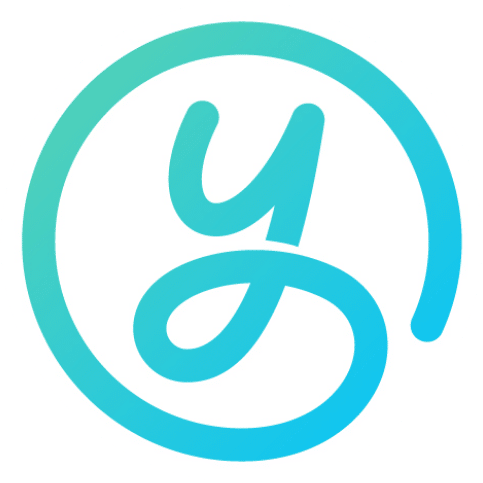If you are looking for Waterloo Engineering essay examples, video interview questions, and general guidance on the Admissions Information Form (AIF), then you’ve come to the right place.
This Application Prep guide is fully updated with the 2022/2023 application.
Before you dive in, it’s important to understand that Waterloo’s admissions committee receives thousands of applications every year. To help stand out from the crowd, you need to demonstrate a clear sense of self, strong life experience, and exemplary communication skills.
We recommend reading both our Deductive Communication Approach™ and Narrative Communication Approach™ skills guides to empower you with the skills to communicate in a clear, compelling, and concise manner on your AIF and during the interview.
You’ll notice the Waterloo Engineering essay templates/examples and sample video interview responses in this guide follow these two communication styles. The purpose of sharing these structures is to help teach you best-practice processes for communication.
Using this structure does not mean your essays and responses will be the same as other students because it is designed to help you create unique essays that are completely authentic to your individual identity and experiences.
If you’re serious about getting into Waterloo Engineering and reaching your fullest post-secondary potential, connect with a coach. It’s never too early to receive coaching.
For more information about Waterloo Engineering, check out this free Waterloo Engineering Program Guide and check out our Waterloo Playlist on YouTube (don’t forget to subscribe for the latest and greatest!).
Table of Contents
- The Admissions Information Form (AIF): Component overview; Optional vs. required essays, and More.
- AIF Section 1, About You Part A: Section overview; Questions 1-5 breakdown; Essay examples and templates; and More.
- AIF Section 2, About you Part B: Section overview; Questions 1-4 breakdown; Essay examples and templates; and More.
- AIF Section 3, Courses: Section overview; Questions 1-6 breakdown; Essay examples and templates; and More.
- AIF Section 4, Engineering: Section overview; Questions 1-8 breakdown; Essay examples and templates; and More.
- Video Interview: How to prepare; Common questions; and More.
2022/2023 Waterloo AIF Example & Video Interview Questions
The Waterloo Engineering OUAC application deadline is February 1, 2023, and the documents deadline (including the AIF and video interview) is February 17, 2023.
The Waterloo Engineering Applicant Admissions Form (AIF) is a required online form (in addition to your video interview, which we’ll discuss below).
REMEMBER: Access your Waterloo Engineering AIF template here. It will help you write unique and memorable essays (keep reading for breakdowns and examples for each question).
In the AIF, you’ll be asked to fill out questions that tell the admissions committee more about you beyond your grades, like your background, interest in the program, prior education, interests, goals, and more.
The Waterloo Engineering AIF has four main components:
- About You: Part A
- About You: Part B
- Courses Completed
- Engineering Essays
There are a few Waterloo Engineering AIF essays in these 4 sections. Some are required, whereas others are optional.
Even though some essays are listed as optional, we strongly recommend that you complete ALL the questions on the Waterloo AIF — including Q1 & Q3 in Section 1 (About You A), Q4 in Section 2 (About You B), and Q1-Q3 in Section 3 (Engineering).
The admissions committee looks at 4 factors when evaluating your application:
- Admission Average
- Adjustment Factor
- Admissions Information Form (AIF)
- Video Interview
Each applicant gets one score across these factors, and then the total of the 4 scores becomes the applicant’s admission score.
Here’s an example:
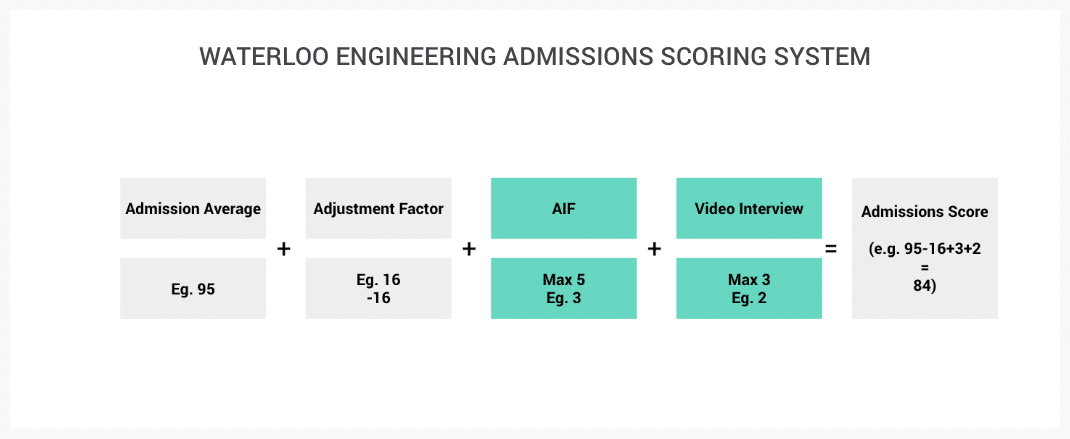
As shown above, your AIF and video interview account for 50% of your overall evaluation.
Put simply, your they are the difference makers for acceptance and rejection.
You can get the highest grades in the world, but if you don’t put in the time to write a standout AIF and strategically prepare for the video interview, then you might not get into your dream program.
How can you do this? Don’t worry, we’ve got your back. 🙂
Keep reading below for tips, strategies, possible questions, and more for both the written and the video questions.
If you have questions about this year’s application and need help taking your AIF and video interview to the next level, connect with a coach to get started.
You Might Also Like
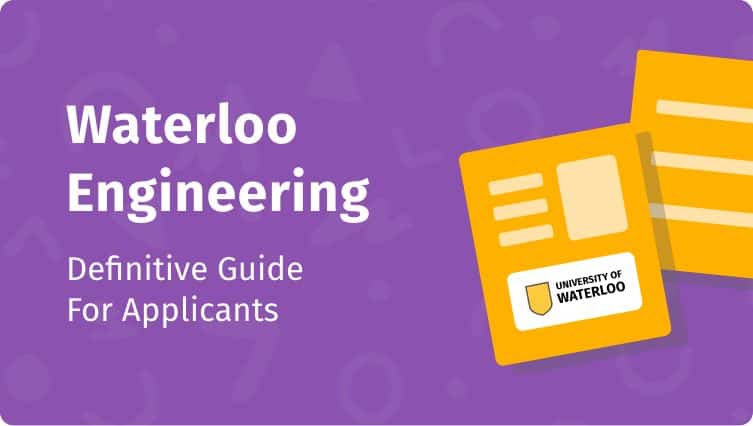
Program Guide
Waterloo Engineering: The Definitive Guide for Applicants (2024)
Whether you’re applying to Waterloo Engineering or simply interested in learning about the program, this guide is for you. As… Read more
Waterloo Engineering AIF Example – Section 1: About You, Part A
This section asks you to describe your interest in the Waterloo Engineering program, as well as details about your extracurriculars and employment activities.
Here are the questions:
WATERLOO ENGINEERING AIF SECTION 1, QUESTION 1 (REQUIRED ESSAY) – REASONS FOR CHOOSING WATERLOO
“Tell us about your education goals, your interest in your chosen program(s), and reasons for choosing to apply to the University of Waterloo (maximum 900 characters).”
Waterloo Engineering Essay Question Breakdown – Reasons for Choosing Waterloo
This question is designed to help the Waterloo Engineering admissions committee get a better sense of who you are, where you come from, and where you want to go.
Seems pretty straightforward, right? Well guess what…they write the question like this on purpose…
Most applicants will give the same types of answers, listing their interest in a career in Engineering and choosing Waterloo because it’s a top-tier program in this field. However, Waterloo wants to see applicants who have thought deeply about their goals, their future, and their interest in Engineering beyond the surface level. Simply saying that you want to graduate and be an engineer will not get you into the program. Instead, you need to come up with a few points that show your uniqueness and authenticity.
Luckily, you’ve already done most of the heavy lifting for the first part of this question (‘tell us about your education goals’) if you’ve completed the Student Identity Blueprint. When you did this, you worked with your coach to create audacious yet authentic goals based off of these aspirations, and you found ways to take them to the next level — and this is exactly what the Waterloo admissions committee wants to see in this section. If you haven’t completed your Blueprint yet, connect with a coach now.
For the second part of this question (‘your interest in your chosen program(s), and reasons for choosing to apply to the University of Waterloo’), do some research on Waterloo Engineering specifically and the university as a whole. See if there are specific professors, clubs, mission statements, courses, etc. that stick out to you. This will show that you have made an educated decision in choosing Waterloo, and that you have just as much to offer them as they will offer you.
Waterloo Engineering AIF Essay Template – Reasons for Choosing Waterloo
Get started on your template here (Click File > Make a Copy within the doc).
The general structure of your answer to this question should have these four parts (click here to learn more about each of them):
- Part 1: Engineering Hypothesis/Answer & Main Reasons (100-200 characters)
- Capture the reader’s attention and give a preview of what’s to come. Be specific to Engineering.
- Part 2: Waterloo Hypothesis/Answer & Main Reasons (100-200 characters)
- Write something captivating that answers the question, “Why Waterloo?”
- Part 3: Supporting Arguments (200-400 characters)
- Give some details as to why Waterloo is the best place for you to study.
- Part 4: So What? (200-300 characters)
- Write a few points about how your goals and interests make you a good fit for the program and an asset to Waterloo more generally.
REMEMBER: Highlight your interest in Waterloo and Engineering here, but don’t panic if you feel like you can’t get into a huge amount of detail about your passion for Engineering. You’ll have plenty of opportunity in Section 4: Engineering to discuss it more.
COACH’S TIP: Don’t worry about writing complete sentences at first. Just write 2-3 bullet points under each section, just to get your ideas down. You can edit and perfect your answers later. If you’d like some more tips about writing these essays, check out our Deductive Communication Approach™ Guide.
Waterloo AIF Example – Reasons for Choosing Waterloo
Here are some examples of how to answer this question.
In this guide, we will give you examples for Electrical Engineering, Systems Design, and Mechatronics Engineering.
REMEMBER: All the essay examples in this guide are EXAMPLES ONLY and are NOT meant for you to copy. Why? First and foremost, this is plagiarism and is a serious offense. Plagiarizing these essays will result in immediate disqualification from the admissions process. This can be easily detected using technology and application reviewers are usually trained and/or able to spot when an application isn’t original and does not align with an applicant’s background, personality, values, etc.
Waterloo AIF Example 1: Electrical

Waterloo AIF Example 2: Systems Design
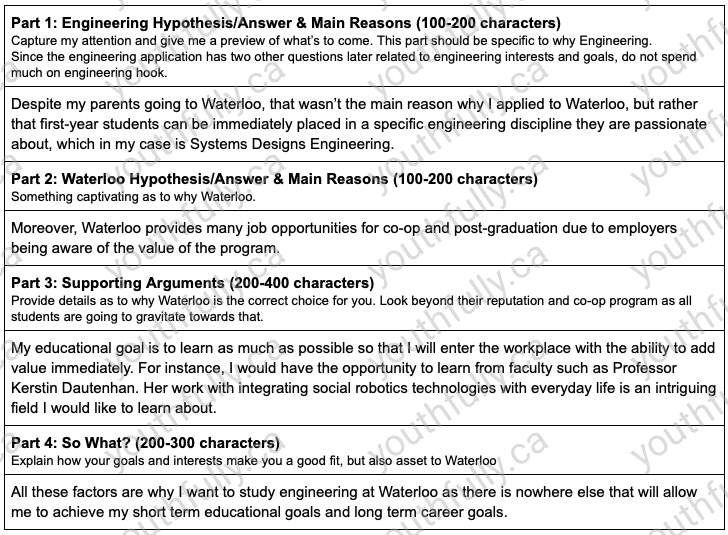
Waterloo AIF Example 3: Mechatronics Engineering
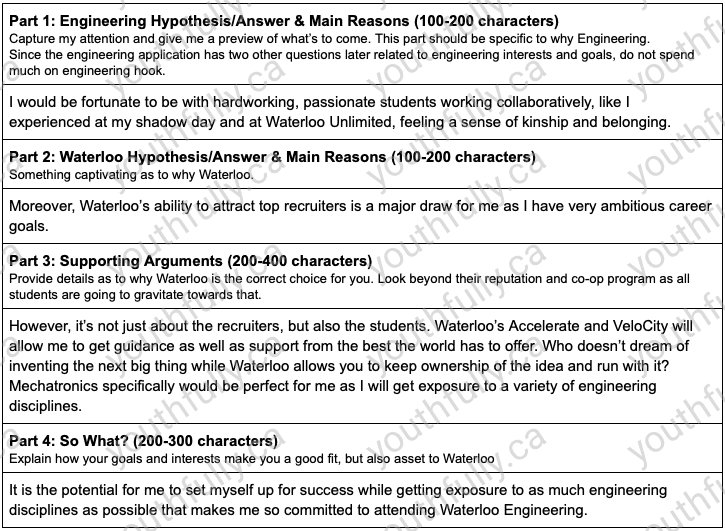
WATERLOO ENGINEERING AIF SECTION 1, QUESTION 2 (REQUIRED LIST) – EXTRACURRICULAR ACTIVITIES
“Please list any extracurricular activities or areas of significant interest. These could include leadership or participation in school organizations or projects, athletics, travel, community, social activities, drama, music, clubs, personal hobbies and/or significant volunteer work.”
Waterloo Engineering AIF Template – Extracurricular Activities
Get started on your template here (Click File > Make a Copy).
This section is one of the easier ones to complete. Simply fill in the:
- Activity Type: Athletics, clubs, community work, drama, hobbies, music, other, project, school organization, social activity, travel, or volunteer
- Description/Title (40 characters or less)
- Start Date (month/day/year)
- End Date (month/day/year)
- Whether you did this activity in Grade 10, 11, or 12
- Hours per week
- Weeks per year
Waterloo Engineering AIF Example – Extracurricular Activities
Here’s an example of what this section might look like:
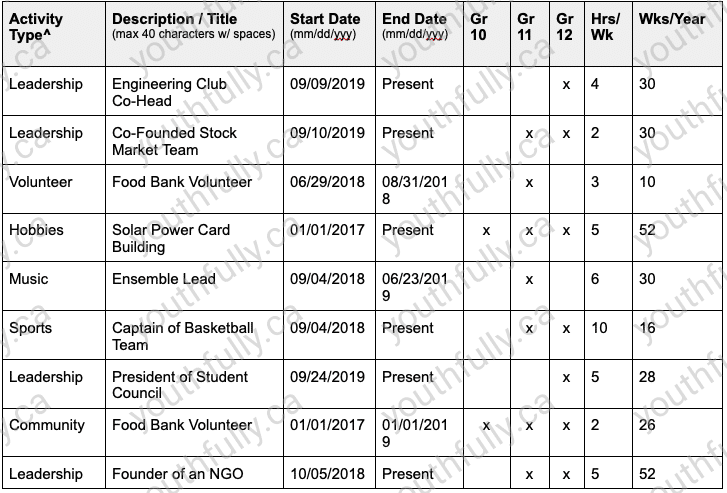
Do you have a bunch of extracurriculars and you’re not sure which to include? Connect with a coach for help.
WATERLOO ENGINEERING SECTION 1, QUESTION 3 (OPTIONAL, BUT RECOMMENDED ESSAY) – EXTRACURRICULAR ACTIVITIES: ADDITIONAL INFORMATION
“Provide any additional information about anything in the table above.”
Waterloo Engineering AIF Essay Question Breakdown – Extracurriculars: Additional Information
This question gives you the opportunity to provide more information about the ECs you listed in the previous section.
We highly recommend completing this section because it will allow you to give the admissions committee some insight into who you are, where you come from, and what you care about. All of this is key if you want your application to stand out.
COACH’S TIP: You only get 600 characters (including spaces) for this question. When writing your essay, focus on your extracurriculars as a whole, and briefly reference 1-2 specific activities as examples. Looking at the big picture (i.e. what you learned, skills you gained, passions you developed, etc.) will show your purpose for taking part in these extracurriculars and how you grew as a person by doing them.
Use this section to focus on the impact your extracurriculars have had on you, what you’ve accomplished, and what you’ve learned along the way. Focus on traits that Waterloo looks for, like being a leader and innovator or being organized and able to manage your time. Drive home the idea that you have real-world skills and that you are using the extracurricular activities as a way to set specific goals that will help you have a positive impact on the world both now and in the future.
Waterloo Engineering AIF Essay Template – Extracurriculars: Additional Information
Get started on your template here (Click File > Make a Copy).
We designed the template for this section to help you highlight your best extracurricular achievements in a memorable and unique way.
REMEMBER: You have a maximum of 600 characters for this section (including spaces).
The general structure of your answer to this question should have these 3 parts (and should be one paragraph in the end):
- Part 1: The Pitch (100 characters)
- Provide a quick high-level pitch of how your extracurriculars have made you a better applicant.
- Part 2: Details (350 characters)
- Mention any quantifiable or significant outcomes from your extracurriculars.
- Part 3: So What? (150 characters)
- Describe what this means to your candidacy (i.e. how does it make you a better applicant and a great fit for the Waterloo Engineering program?)
COACH’S TIP: In this section, make sure you showcase your problem solving, time management, leadership, and/or engineering commitment in each. This will help your application stand out and be more memorable.
Waterloo AIF Example – Extracurriculars: Additional Information
Here’s an example of how to answer this section:
Waterloo AIF Example 1: Electrical

Waterloo AIF Example 2: Systems Design

Waterloo AIF Example 3: Mechatronics
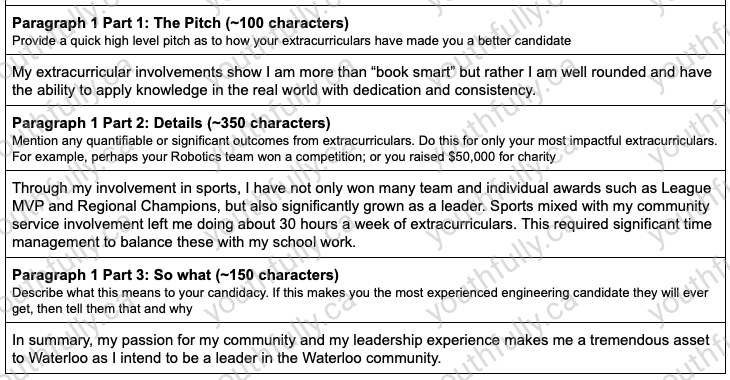
WATERLOO ENGINEERING AIF SECTION 1, QUESTION 4 (REQUIRED LIST) – EMPLOYMENT
“Please list your most significant part-time or full-time employment in the past 2 years, beginning with the most recent.”
If you have been away from school or university for more than two years, you can send a current resume to myapplication@waterloo.ca (make sure to include your Waterloo ID#).
Waterloo Engineering AIF Template – Employment
Get started on your template here (Click File > Make a Copy).
Enter your employment experience in reverse chronological order (i.e. your older experiences at the bottom and your most recent at the top).
Fill in these components:
- Employer (max 30 characters with spaces)
- Description/Title (max 50 characters with spaces)
- Brief description of work/your role (max 254 characters with spaces)
- Hours of work per week
- Start date
- End date
Waterloo AIF Example – Employment
Here’s a Waterloo Engineering essay example of what this section might look like:

WATERLOO ENGINEERING SECTION 1, QUESTION 5 (REQUIRED LIST) – SPECIAL ACHIEVEMENTS, DISTINCTIONS, AND AWARDS
“If you have received any academic or non-academic awards or distinctions, please list them below. Please provide the Size of Competition if you know how many people participated.”
Waterloo Engineering AIF Template – Special Achievements, Distinctions, and Awards
Get started on your template here (Click File > Make a copy).
Enter your special achievements/awards/distinctions in reverse chronological order (i.e. your older experiences at the bottom, and your most recent at the top.
Fill in these components:
- Award Type (i.e. academic or non-academic)
- Award, honour, or distinction type/name (254 characters with spaces)
- Year you received it
- Size of the competition (i.e. how many people you competed against/how big the applicant pool was)
Waterloo AIF Example – Special Achievements, Distinctions, and Awards
Here’s a Waterloo Engineering Essay Example of what this section might look like:

Stand out with a unique AIF & interview.
get a youth coach™Alex
Waterloo Eng
Expert
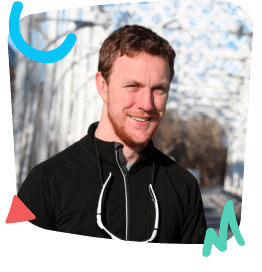
Waterloo AIF Example – Section 2: About You, Part B
This section asks you to describe your prior education, and you’ll have the opportunity to discuss any relevant outside circumstances or additional personal information.
Here are the questions:
WATERLOO ENGINEERING SECTION 2, QUESTION 1 (OPTIONAL ESSAY) – CIRCUMSTANCES
“Are there any issues or circumstances (e.g., medical, personal, or financial) that may have affected your academic record? If YES, please describe the circumstance in detail below. We are particularly interested in issues or circumstances that directly affected your academic performance and that led to a rise or drop in grades or to changes in your academic or personal goals. (900 character limit)
Note: If you need more space than what’s provided below to submit additional information about your issues or circumstances, please include this information in the Question #4 – Additional Information box at the bottom of this page.”
Waterloo Engineering AIF Essay Question Breakdown – Circumstances
Whether we like it or not, sometimes tough things happen that are beyond our control.
Waterloo Engineering recognizes this, and wants to hear about any circumstances that might have affected your academic performance, extracurricular participation, etc. Use this section to discuss an event or circumstance that caused you to struggle during high school and one that might have affected your grades, like an accident, death in the family, financial restrictions, or other situations.
When writing about your specific circumstance, make sure you emphasize the impact that it has had on you. Depending on your situation, it’s also a great idea to use this tough time as a way to emphasize positive things, like lessons you learned, your resilience and determination, and/or your appreciation for a support system that helped get you through it all. Use this essay as a way to show that greatness comes from adversity, and that you’ve become stronger as a student, leader, and person because you went through it.
Not sure what qualifies in this section? Not sure if your circumstance is worth mentioning? Connect with a coach to discuss it more.
REMEMBER: This section is optional. Don’t make up a circumstance because you feel like you have to. This section is an opportunity for you to explain a dip in your grades, but if you don’t have one, skip this section.
Waterloo Engineering AIF Essay Template – Circumstances
Get started on your template here (Click File > Make a Copy).
The general structure of your answer to this question should have these 3 parts (get a detailed breakdown of these components here):
- Answer/Hypothesis (<150 characters)
- Start by simply mentioning what the circumstance was.
- Main Reasons & Supporting Argument (<400 characters)
- How did this impact your grades/academic performance?
- So What? (<350 characters)
- Describe what you learned from this situation and how it will make you a better student at Waterloo.
Waterloo AIF Example – Circumstances
Here are some examples of how to answer this question that discusses an accident the student was involved in.
REMEMBER: This is an EXAMPLE ONLY and is NOT meant for you to copy. Why? First and foremost, this is plagiarism and is a serious offense. Plagiarizing these essays will result in immediate disqualification from the admissions process. This can be easily detected using technology and application reviewers are usually trained and/or able to spot when an application isn’t original and does not align with an applicant’s background, personality, values, etc.
Waterloo AIF Example 1: Accident
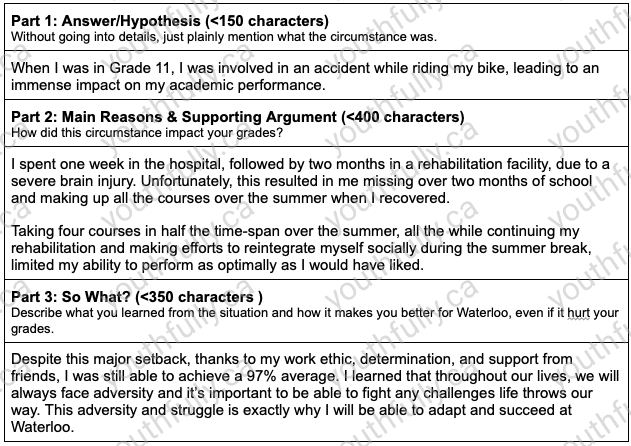
Waterloo AIF Example 2: Death In Family

Waterloo AIF Example 3: Numerous Situations
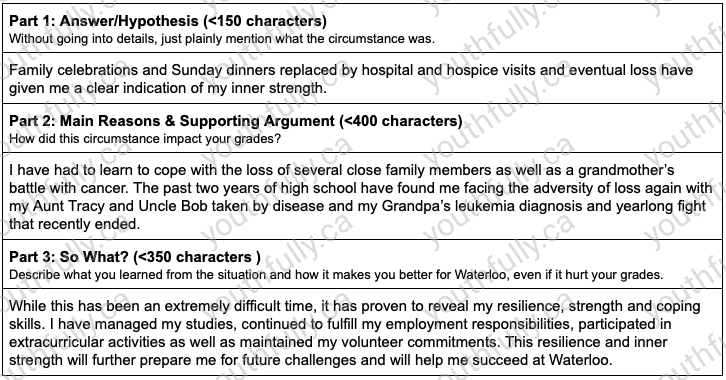
WATERLOO ENGINEERING, SECTION 2, QUESTION 2 (REQUIRED LIST) – INSTITUTION(S) ATTENDED
“The name and location of the secondary or post-secondary school(s) you are now attending or have attended should be listed below. Are any secondary or post-secondary schools missing from the list? If yes, please add them in the space below.”
For this section, simply write the name and location of the secondary/post-secondary institution(s).
WATERLOO ENGINEERING AIF SECTION 2, QUESTION 3 (OPTIONAL LIST) – POST-SECONDARY EDUCATION
“Have you taken or are you currently taking courses at a college or university?
If yes, give the name of the college or university, the start and end dates of your studies there, and the number of courses you took. You are required to submit all official final college or university transcripts.”
WATERLOO ENGINEERING AIF SECTION 2, QUESTION 4 (OPTIONAL, BUT RECOMMENDED ESSAY) – ADDITIONAL INFORMATION
“In addition to the specific information requested in all of the AIF questions, please tell us anything else about yourself that you would like us to know when we review your application. Please make sure to complete all sections of the AIF before submitting this page. (900 character limit)”
Waterloo Engineering AIF Essay Question Breakdown – Additional Information
Think of this essay as your final pitch to the admissions committee about why you should be accepted to the Waterloo Engineering program.
There are thousands of applicants — what makes YOU different?
Is there a certain trait that everyone always mentions, like your unwillingness to give up, your epic math skills, or your ability to see the world in a unique way? That trait is exactly what you should focus on here.
Digging deeper into this will drive home the point that you are different from other applicants and that the admissions committee would be crazy not to let you in.
Using this essay to explore differentiating traits will also show that you have self-awareness and have an interest in constantly improving. If you’ve filled out our Student Identity Blueprint, then you probably have a pretty good idea about all the cool things that make you, you — and now it’s time to share them (keep reading to learn how). If you haven’t filled out your Blueprint, connect with a coach to get started.
Waterloo Engineering AIF Essay Template – Additional Information
Get started on your template here (Click File > Make a Copy).
We designed this template so that you can choose one thing that differentiates you from everyone else, like your creativity, perseverance, or your wide range of experiences, which are all things that the admissions committee looks for.
The general structure of your answer to this question should have these four parts (get a detailed breakdown of these components here):
- Part 1: Answer/Hypothesis (100-300 characters)
- Introduce that one thing that helps you stick out from other candidates.
- Part 2: Main Reasons & Supporting Argument (300-450 characters)
- Tell the admissions committee how you would describe yourself. Be personable and unique here, while making it clear why this one trait is such an important differentiator.
- Part 3: So What? (100-150 characters)
- Provide a final explanation of why you are the best fit for Waterloo and why you know you will succeed there.
- Part 4: Discussion/Conclusion
- Write a final explanation about of your Main Reasons/Supporting Arguments. Try to make it catchy and memorable.
COACH’S TIP: This section is your final pitch — it’s the last opportunity you have to tell the admissions committee why you would be a great fit for Waterloo, so make it count!
Not sure which differentiator to focus on? Connect with a coach to choose the best one.
Waterloo AIF Example – Additional Information
Here are some essay examples for this question, focusing on various differentiators:
Waterloo AIF Example 1: Creativity
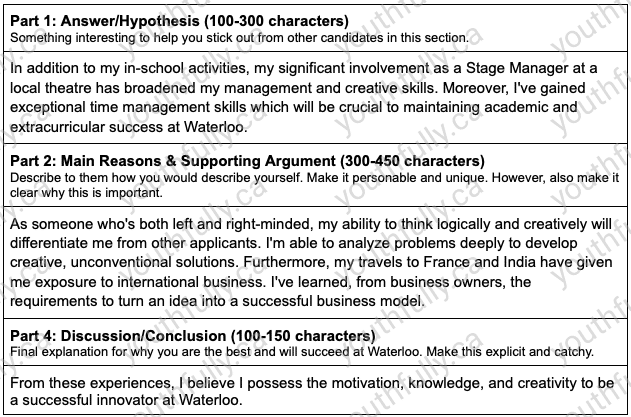
Waterloo AIF Example 2: Perseverance
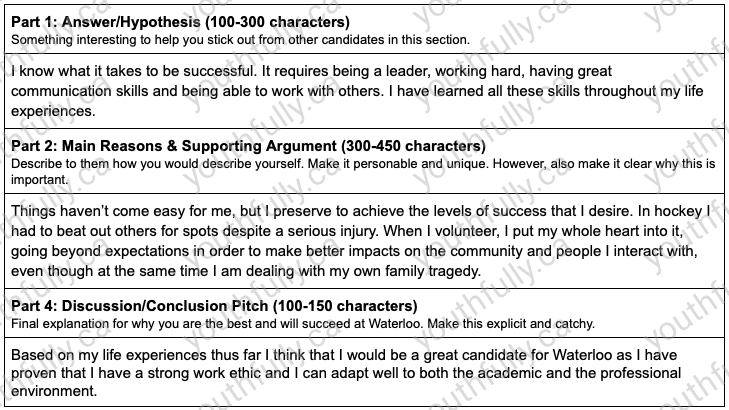
Waterloo AIF Example 3: Multi-Faceted Pitch
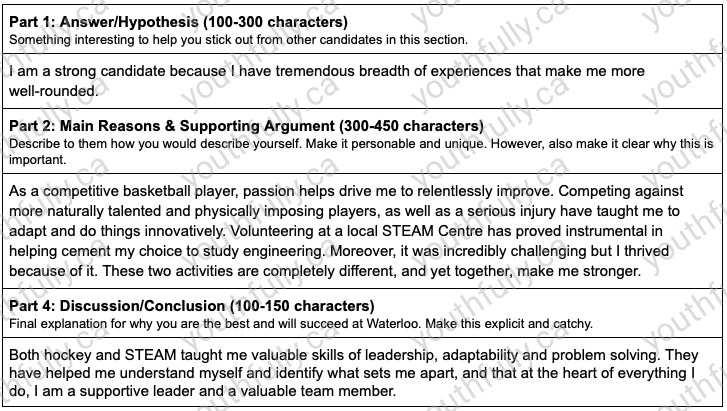
You Might Also Like
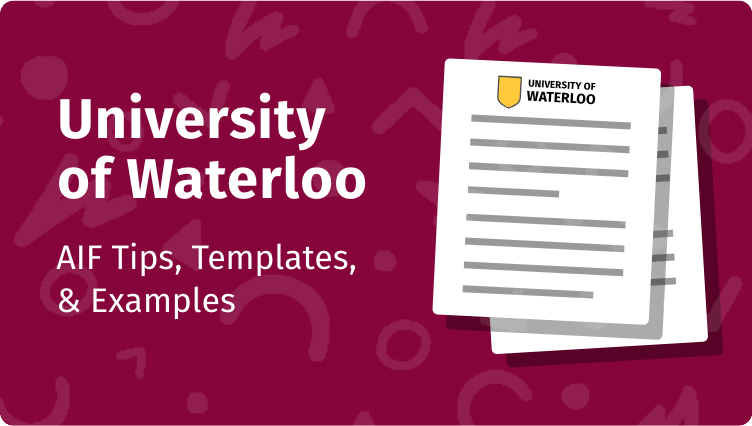
Application Prep
University of Waterloo: AIF Tips, Questions, & Examples 2023/2024
If you’re looking for Waterloo Applicant Information Form (AIF) questions, examples, and prep tips, then you’ve come to the right… Read more
Waterloo AIF Example – Section 3: Courses
This section focuses on the coursework you’ve completed in school, as well as additional outside courses.
Here are the questions:
WATERLOO ENGINEERING SECTION 3, QUESTION 1 (REQUIRED LIST) – CURRENT COURSES
“List your current courses and courses that you will complete by the end of the academic year.”
Waterloo Engineering AIF Template – Current Courses
Get started on your template here (Click File > Make a Copy).
You are required to list the following information:
- Course name
- Level
- Scool
- Completion Date (if incomplete, write IP)
- Whether you added this course as (if applicable)
- Night School
- Summer School
- Saturday School
- Distance Education/Online
- Repeated
- Course mark
COACH’S TIP: There are specific instructions for Ontario students, students outside of Ontario, and all students, so make sure you read the instructions carefully to ensure you’re giving the correct information. Also, do not try to convert your grades from 1-100 (e.g. 91%). AP uses grading from 1-5, so under “level” list AP and then put the actual grade in the course mark section.
Waterloo AIF Example – Current Courses
Here’s an example of what this section might look like:

WATERLOO ENGINEERING SECTION 3, QUESTION 2 (OPTIONAL LIST) – COURSES PRIOR TO FALL 2021
“List all the courses you’ve taken in Grades 9-11.”
Waterloo Engineering AIF Template – Courses Prior to Fall 2021
Get started on your template here (Click File > Make a Copy).
You are required to list the following information:
- Course name
- Level
- Scool
- Completion Date
- Whether you added this course as (if applicable)
- Night School
- Summer School
- Saturday School
- Distance Education/Online
- Repeated
- Course mark
COACH’S TIP: Just like in Question 1, make sure you read the instructions carefully for Ontario students, students outside of Ontario, and all students.
WATERLOO ENGINEERING AIF SECTION 3, QUESTION 3 (OPTIONAL ESSAY) – ADDITIONAL COURSE INFORMATION
“If you are not attending high school, CEGEP, or equivalent, list courses relevant to our admission requirements for the program(s) you applied to. Please explain your background in this section. (900 character limit)”
Waterloo Engineering AIF Essay Question Breakdown – Additional Course Information
This essay does not need to be extremely detailed, but it is meant to provide the admissions committee with a brief explanation about additional courses you’ve completed and why you completed them.
Answer these questions in your essay:
- What was the additional courses?
- When did you take this course?
- Why did you take this course?
- What was the outcome?
- How will it help you at Waterloo (optional)?
Do this for every course that falls into this category, making a separate paragraph for each.
Waterloo Engineering AIF Template – Additional Courses Information
Get started on your template here (Click File > Make a Copy).
Complete this section if you took courses outside of high school that weren’t repeated or upgrade courses.
We designed this template in a way that will help you organize your thoughts and give the necessary background for each course, so that you can easily turn it into an essay.
You’ll see sections for: When, Course Name, and Background.
Add bullet points in each section, and when you’re done, take out the bullet points and make complete sentences. It’s that easy!
Waterloo AIF Example – Additional Courses Information
Here’s an example of this question using the template, and then easily turning it into an essay:

Here’s an example of an essay from the above example:
In the summer of 2017 after I graduated high school, I took a C++ course. We never had a specific C++ class in high school, however, I wanted to broaden my skills and therefore while I was out of high school, I took a C++ course that I believe will assist me in Software Engineering at Waterloo.
Moreover, in the fall of 2017 while I was working, I took a computer engineering class. Although there was a computer engineering class in high school, since it was not a requirement for any programs, I did not take it. Now that I want to attend Systems Design Engineering, I believe this will be a valuable class to take.
WATERLOO ENGINEERING AIF SECTION 3, QUESTION 4 (OPTIONAL ESSAY) – COURSES NOT TAKEN AT YOUR REGULAR DAY SCHOOL
“Please provide a reason why any Grade 12 (or equivalent) courses listed above were not taken at your regular day school. (900 character limit)”
Waterloo Engineering AIF Essay Question Breakdown – Courses Not Taken at Your Regular Day School
This essay does not need to be extremely detailed, but it is meant to provide the admissions committee with a brief explanation about courses you’ve completed outside of regular school and why.
Answer these questions in your essay:
- What was the course?
- When did you take this course?
- Why did you take this course?
- What was the outcome?
- How will it help you at Waterloo (optional)?
Do this for every course that falls into this category, making a separate paragraph for each.
Waterloo Engineering AIF Essay Template – Courses Not Taken at Your Regular Day School
Get started on your template here (Click File > Make a Copy).
If you checked “Night School”, “Summer School”, “Saturday School”, or “Distance Education/Online” for any courses in Question 1 and/or Question 2, explain why you took those courses here.
Like Question 3, we’ve created a template that will help you create bullet points under “Course Name” and “Explanation” for each course, and then use that to easily create an essay afterwards.
Do this for every course that falls into this category.
Waterloo AIF Example – Courses Not Taken at Your Regular Day School
Here’s an example of this question using the template, and then easily turning it into an essay:

Here’s an example of an essay from the above example:
I took ENG4U in summer school. As a result of playing Junior Hockey, my workload during the school year is intense. As a result, I need to take courses in the summer to balance the workload during the school year. Even though I am taking one less class during the year, I still have an above workload during the year as a result of hockey.
WATERLOO ENGINEERING SECTION 3, QUESTION 5 (OPTIONAL ESSAY) – REPEATED COURSES
“Please provide a reason why any Grade 12 (or equivalent) courses listed above were repeated. (900 character limit)”
Waterloo Engineering AIF Essay Question Breakdown – Repeated Courses
This essay does not need to be extremely detailed, but it is meant to provide the admissions committee with a brief explanation about courses you’ve had to redo and why.
Answer these questions in your essay:
- What was the course?
- When did you take this course?
- Why did you have to take this course again?
- What was the outcome?
Do this for every course that falls into this category, making a separate paragraph for each.
Waterloo Engineering AIF Essay Template – Repeated Courses
Get started on your template here (Click File > Make a Copy).
If you took a class again, like Grade 12 Math or English, explain why you did that here.
REMEMBER: If you repeat a required course, Waterloo will either take the original grade OR the new grade, and then deduct 5 points off that. For example, if you got an 80 the first time you took Grade 12 Math and then you took it again and got a 90, Waterloo will record it as an 85. If it is not a required course, there will be no adjustment.
Like Question 4, we’ve created a template that will help you create bullet points under “Course Name” and “Explanation” for each course, and then use that to easily create an essay afterwards.
Do this for every course that falls into this category.
Waterloo AIF Example – Repeated Courses
Here’s a Waterloo Engineering essay example of this question using the template, and then easily turning it into an essay:

Here’s a Waterloo Engineering essay example from the above example:
Due to the circumstances listed previously, my grades in ENG4U fell sharply. As a result, I repeated the course in order to improve it and perform as I normally would had it not been for the circumstances. My original attempt at ENG4U was 15% lower than my ENG3U and therefore I was confident that I could do much better. After repeating ENG4U, my grade was 10% higher than my ENG3U course.
WATERLOO ENGINEERING AIF SECTION 3, QUESTION 6 (OPTIONAL ESSAY) – UPGRADING
“If you have been out of school and are in the process of refreshing your academic skills for admission to the University of Waterloo, such as by taking pre-university-level mathematics courses, please list the course(s) below. (600 character limit)”
Waterloo Engineering AIF Essay Question Breakdown – Upgrading
This essay does not need to be extremely detailed, but it is meant to provide the admissions committee with a brief explanation about courses you’ve had to redo and why.
Answer these questions in your essay:
- What was the course?
- When did you take this course?
- Why didn’t you complete this course previously?
- What was the outcome?
Do this for every course that falls into this category, making a separate paragraph for each.
If you have the character space, briefly emphasize your passion for engineering here. Showing willingness to upgrade so that you can pursue a degree in the field of engineering will showcase your passion, dedication, and interest in engineering.
Waterloo Engineering AIF Essay Template – Upgrading
Get started on your template here (Click File > Make a Copy).
Like Question 5, we’ve created a template that will help you create bullet points under “Course Name” and “Explanation” for each course, and then use that to easily create an essay afterwards.
Do this for every course that falls into this category.
Waterloo AIF Example – Upgrading
Here’s an example of this question using the template, and then easily turning it into an essay:

Here’s a Waterloo Engineering example of an essay from the above example:
After graduating high school, I took MCV4U at an adult high school. Originally when I graduated high school, I wanted to go onto Political Science and therefore I did not require this course. However, I have since realized that my passion lies with engineering and therefore I took MCV4U in order to be eligible for Software Engineering at Waterloo.
If you are unsure about what category your courses fall under for Questions 3-6, or you’re unsure about how to create simple and informative essays to explain each course, connect with a coach anytime for help.
You Might Also Like
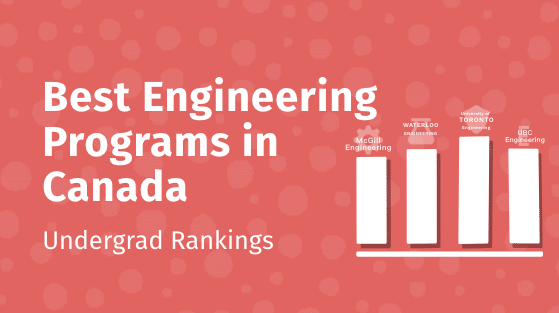
Rankings & Lists
Best Engineering Schools in Canada 2023/2024 (Undergraduate Programs)
Want to learn what the best universities in Canada for Engineering are? You’ve come to the right place. We know… Read more
Waterloo AIF Example – Section 4: Engineering
The last section of the AIF gives you the opportunity to show the admissions committee your prior knowledge and interest in engineering. You talked about it a bit in Section 1, but here you can really expand on it.
WATERLOO ENGINEERING AIF SECTION 4, QUESTION 1 (REQUIRED ESSAY) – ENGINEERING INTERESTS & GOALS
“Briefly explain why you are interested in engineering and particularly in the program to which you have applied. Comment, for example, on your interests and abilities; your career goals; exposure to engineering through school-related and other experiences; and discussions you have had with engineers, teachers, current or past Waterloo students. (900 character limit)”
Waterloo Engineering AIF Essay Question Breakdown – Engineering Interests & Goals
This section is entirely focused on why you’re interested in engineering, what your university and career goals are, and how Waterloo Engineering can help make those goals a reality. It is meant to be a general overview of your interests and goals (more on this below).
First, focus on answering the question “Why Engineering?”. This can include talking about when you first became interested in engineering, your exposure to engineering thus far (like through courses you’ve taken, books you’ve read, extracurriculars, etc.), or a family member/friend who inspired you to pursue a career in this field. Was there a ‘eureka’ moment in your life when you knew that this is what you wanted to do? When writing this section, think beyond simple statements like “I always knew I wanted to be an engineer.” Dig deeper and find the why.
Then, based off your interest in this field, briefly discuss the goals you’ve set for yourself. Show the admissions committee that you’ve really thought about what you want your future to look like. Do you want to be an engineer so that you can make a positive difference in the world and help people? Do you see a problem that you think you can solve? Are you excited to innovate to make the world a better place? Talk about these things a bit here. Then, emphasize the fact that Waterloo Engineering is the only program that can help get you there (don’t give away too much about your goals while you’re at Waterloo Engineering because you’ll have the chance to get into that more in the next question).
Incorporating these points will articulate your passion and dedication, while showing the admissions committee that you would contribute to and make a great addition to their program.
Waterloo Engineering AIF Essay Template – Engineering Interests & Goals
Get started on your template here (Click File > Make a copy).
The general structure of your answer to this question should have these 3 parts (get a detailed breakdown of these components here):
- Part 1: Answer/Hypothesis (100-175 characters)
- Write a quick and interesting statement to grab the reader’s attention and make it clear that you’re interested in engineering
- Part 2: Main Reason & Supporting Arguments (350-500 characters)
- Write a few sentences about what got you interested in engineering and what continues to keep you interested in it. Talk about your interests, exposure, etc.
- Part 3: So What? (250-400 characters)
- Based on your interest in engineering, what are your long-term engineering goals and (briefly) how you will achieve them.
COACH’S TIP: This section is for a high-level description of your interests including your long-term career goals. Question 2, on the other hand, is more detailed in that it explains how Waterloo specifically will help you with the goals you outline in Question 1.
Waterloo AIF Example – Engineering Interests & Goals
Here are examples of how to answer this question for Electrical Engineering, Systems Design, and Mechatronic Engineering.
REMEMBER: These are EXAMPLES ONLY and are NOT meant for you to copy. Why? First and foremost, this is plagiarism and is a serious offense. Plagiarizing these essays will result in immediate disqualification from the admissions process. This can be easily detected using technology and application reviewers are usually trained and/or able to spot when an application isn’t original and does not align with an applicant’s background, personality, values, etc.
Waterloo AIF Example 1: Electrical Engineering
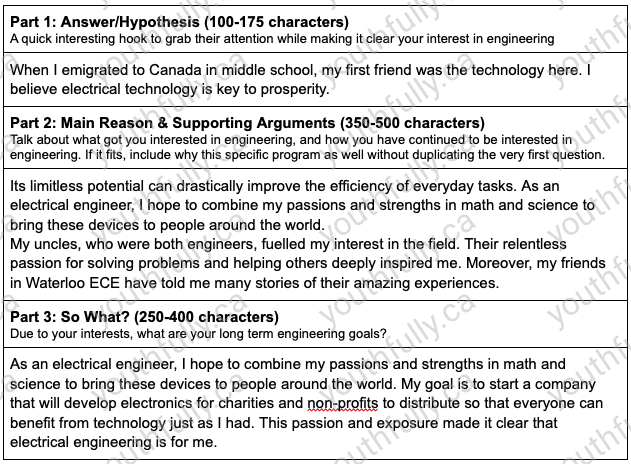
Waterloo AIF Example 2: Systems Design
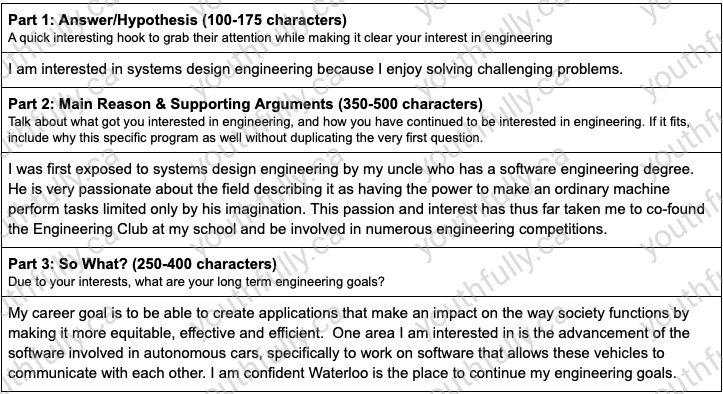
Waterloo AIF Example 3: Mechatronics Engineering
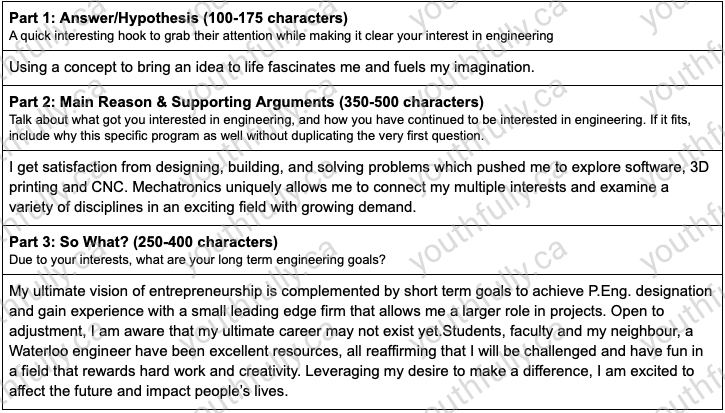
WATERLOO ENGINEERING AIF SECTION 4, QUESTION 2 (REQUIRED ESSAY) – MORE ABOUT YOUR GOALS
“What sorts of things would you like to do or accomplish in Waterloo Engineering and why? (900 character limit)”
Waterloo Engineering AIF Essay Question Breakdown – More About Your Goals
You’ll notice that this question is really similar to Section 4, Question 1 (and they’ve done that on purpose). In the previous question, you discussed where your interest in engineering came from and how it has developed over your time, and briefly mentioned some goals that you have as they relate to engineering. This provides a general overview of your interests and goals.
In this essay question, you’re asked for a future-focused and specific breakdown of your goals and how they directly relate to Waterloo Engineering. List some goals (like the ones you mentioned in the previous section) and then relate them to this specific program. It is better to choose 1 or 2 really focused goals, rather than a bunch of goals you haven’t thought much about or can’t back up. Quality over quantity here.
Before writing anything, do some research on the Waterloo Engineering program, like notable faculty, students clubs and societies, the different fields of engineering that the program offers, co-op opportunities, etc. Check out our Waterloo Engineering Guide for all the essential information about the program, all in one place.
Write specific examples of how these aspects of the program can help you reach those goals if you were accepted. This is the ‘why’ part of the question. For example, say your dream is to develop a program that allows people to donate to a cause they care about by rounding up payment on their purchases (like if they buy a sweater and it’s $45.00, then their bank app will automatically round up to $50 and donate $5 to a charity of their choice). You talk about this a bit in Section 4, Question 1, but here you show exactly how attending Waterloo Engineering can make this a reality. You could write that Waterloo’s extensive program offerings, like Computer Engineering and Software Engineering, would allow you learn improve your prototype app while learning other ways to make it more user-friendly. You could also mention a Waterloo Engineering professor who has worked on a similar program and could help you take yours to the next level.
If you aren’t sure which goals to choose, connect with a coach for support.
Waterloo Engineering Essay Template – More About Your Goals
Get started on your template here. (Click File > Make a Copy)
The general structure of your answer to this question should have these 3 parts (get a detailed breakdown of these components here):
- Part 1: What (Answer/Hypothesis) (400-600 characters)
- Describe the things you want to achieve at Waterloo Engineering
- Part 2: Why (Main Reason & Supporting Arguments) (200-400 characters)
- Describe why you want to do these things
- Part 3: Conclusion (So What?) (less than 150 characters)
- Describe how doing these things will help you achieve your long-term goals
COACH’S TIP: Make sure your answer is laser-focused on Waterloo here. You want to show that your interests align with Waterloo Engineering specifically and that it’s the only program that will help you achieve your goals (while also showing that you’ll make a great addition to the program).
Waterloo AIF Example – More About Your Goals
Here are some examples of how to answer this question.
Waterloo AIF Example 1: Electrical Engineering
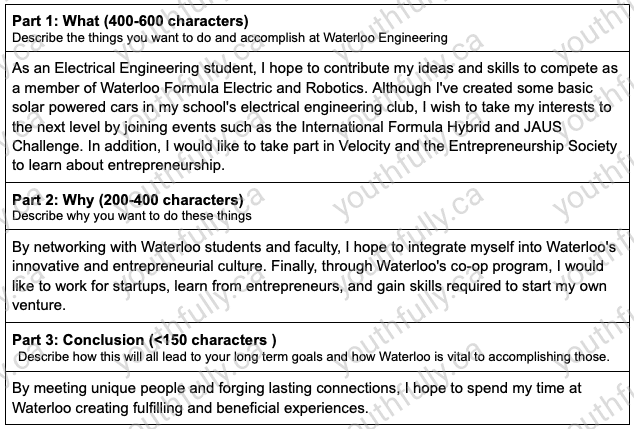
Waterloo AIF Example 2: Systems Design
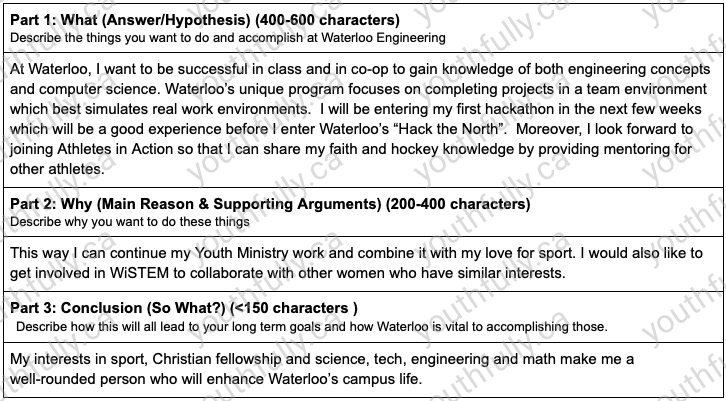
Waterloo AIF Example 3: Mechatronics
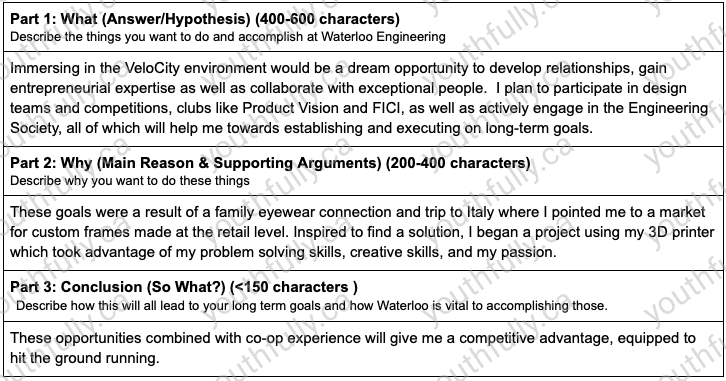
WATERLOO ENGINEERING AIF SECTION 4, QUESTION 3 (OPTIONAL ESSAY, BUT REQUIRED FOR SOFTWARE ENGINEERING) – PROGRAMMING KNOWLEDGE
“If you have applied to Software Engineering you are required to demonstrate that you have experience in developing well-structured, modular programs. However, all applicants should list their programming experience if applicable.
For every programming language in which you have at least four months of programming experience, list the language, number of months experience you have in using the language (not how long you have known it), and capacity in which you used the language (e.g., courses completed, work experience, self education). (600 character limit)”
Waterloo Engineering AIF Template – Programming Knowledge
Get started on your template here (Click File > Make a Copy).
In this section, you need to list the programming languages that you’ve had at least four months of experience with.
We designed this template so that you can provide a quick snapshot of your abilities, while also showing how they are applicable to the program you’re applying to.
In the template, write the following details:
- Programming Language
- Duration
- Description (less than 150 characters)
Waterloo AIF Example – Programming Knowledge
Here’s an example of what this section might look like:
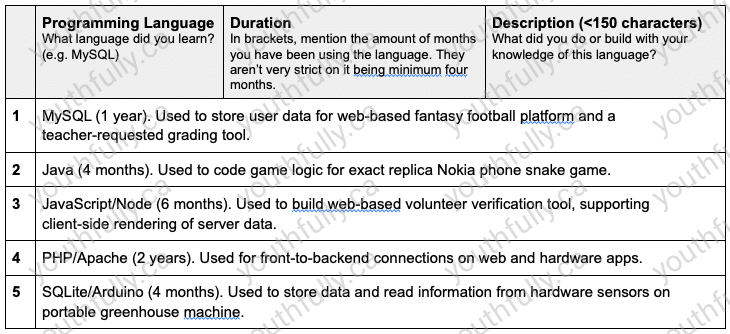
WATERLOO ENGINEERING AIF SECTION 4, QUESTION 4 (CHECKBOX) – SCHOLARSHIPS
“Do you want to be automatically considered for an entrance scholarship? A separate application form is not required. Please see Questions 5, 6, and 7 below for special instructions.”
In this section, simply check the “Yes” or “No” box.
WATERLOO ENGINEERING AIF SECTION 4, QUESTION 5 (CHECKBOX) – SHAD VALLEY
“If you have attended the Shad Valley program, you can be considered for one of our scholarships for Shad Valley alumni. Be sure to discuss Shad Valley experiences in your AIF.”
In this section, simply check the “Yes” or “No” box.
WATERLOO ENGINEERING AIF SECTION 4, QUESTION 6 (CHECKBOX) – FIRST Robotics Participation
“Some Engineering applicants may be eligible for a unique scholarship based on their participation with FIRST (For Inspiration and Recognition of Science and Technology).
Have you been active on a FIRST team? If so, please be sure to discuss your FIRST experiences in your AIF.”
In this section, simply check the “Yes” or “No” box.
WATERLOO ENGINEERING AIF SECTION 4, QUESTION 7 (REQUIRED, IF APPLICABLE CHECKBOX) – CHEMICAL, CIVIL, ENVIRONMENTAL OR MECHANICAL ENGINEERING
“If your first choice program is Chemical, Civil, Environmental or Mechanical Engineering, consider applying for the $10,000 Suncor Emerging Leaders Awards Program. Applicants must complete the online interview that will be used in the selection. This is one of Waterloo Engineering’s premium awards, and further details are available here. Are you planning to apply?”
In this section, simply check the “Yes” or “No” box.
Did you know that our Youth Coaches have helped over 1,000 students win more than $5 million in scholarships? Work 1-on-1 with a coach to learn more about Waterloo’s scholarships and create a memorable and unique application to improve your chances of winning.
WATERLOO ENGINEERING AIF SECTION 4, QUESTION 8 (SHORT TEXT) – ALTERNATIVE CHOICES
“If we are unable to offer you a place in your first-choice Engineering program, we may be able to consider you for an alternate Engineering program by clicking the link below.”
Click the “Alternative Choices” link and choose the other engineering option.
Find the mentor you’ve been looking for.
learn more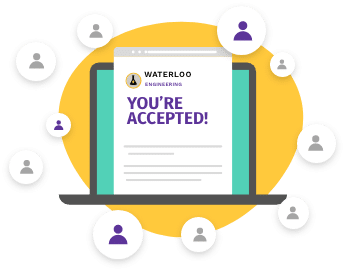
Waterloo Engineering Interview
Great job! You’ve finished Waterloo’s AIF! Now it’s time to focus on the video interview.
We know that video interviews might seem scary, but with the proper preparation and guidance, you’ll have the confidence and communication skills you need to conquer this part of your application.
Waterloo Engineering Interview Questions – Breakdown
The Waterloo Engineering video interview is technically optional, but we HIGHLY recommend you complete it because it counts for 3 points of your overall application.
This interview has 2 questions.
Here’s a quick snapshot of what you can expect for your video interview:
- It’s done in a separate video interview platform, where you can take practice questions to get the hang of the system. You’ll get an email from this platform asking you to check in.
- Takes 30-60 minutes to complete the entire assessment process.
- Starts with a Welcome video that you must watch, and then you Register (add name, photo, and email address), then test your camera, microphone, and browser.
- You get 2 practice questions so you can get more familiar with the platform.
- 1 video question, with 30-60 seconds of prep time and then 60-90 seconds to give your final answer
- 1 written OR video question. For the written question, you’ll have 10 minutes to answer.
Over the years, we’ve noticed that the Waterloo Engineering video interview questions can generally be split up into 2 categories: Personal Questions and Creative/Problem-Solving Questions.
Waterloo Engineering Interview – Question 1: Personal Questions
Question 1 will almost always be a personal question, where you’ll be asked to tell the admissions committee some information about you, like your skills, interests, goals for the future, experiences you’ve had, etc.
COACH’S TIP: For Personal Questions like these, we recommend using storytelling to help make your answers more unique, memorable, and authentic. Check out our Narrative Communication Approach™ Guide to learn more.
While you won’t know the exact questions until you start the video interview, there are a few common Personal Questions we’ve seen over the years:
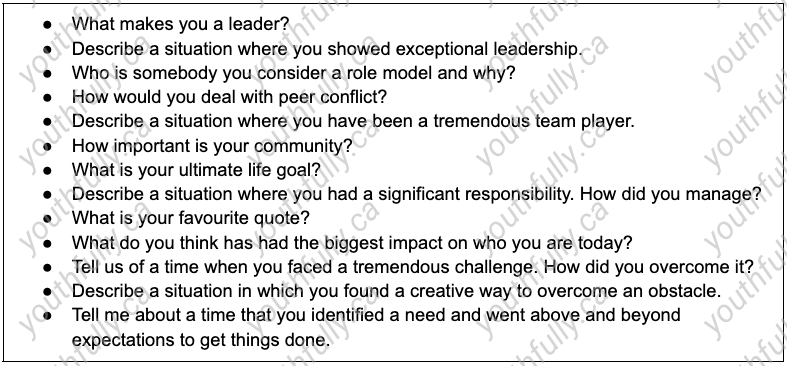
Not sure how to approach and answer these questions? Check out our Interview Prep Skills Guide, where we break down exactly how to give unique and memorable answers to these types of questions.
Need more help? Connect with a coach to improve your communication skills, think about possible questions and how you’ll answer them, and do mock interviews. We guarantee this preparation will give you the confidence you need to pull off a truly outstanding video interview.
Waterloo Engineering Interview – Personal Question Example
Here’s a sample response to the Personal Question: “Who is somebody you consider a role model, and why?”:
Waterloo Engineering Interview – Question 2: Creative/Problem-Solving Questions
The second question will almost always be a creative/problem-based question, and it will be EITHER a video OR written question.
There are 3 general types of questions you could be asked for Question 2:
- A position question: They will give you a statement, and ask if you agree or disagree. Always pick one side and then justify.
- A personal preference question: This is similar to the position questions, but your own experiences should drive your answers.
- A deductive reasoning question: They give you a problem to solve, and you must use deductive reasoning to come to a conclusion.
We know that these questions can seem overwhelming. Learn more about how to approach problem-solving questions in our Interview Prep Guide.
Since you won’t know if the second question is a written or video response, practice questions should be done in both formats so you’re prepared for whatever comes your way. Also, make sure you have a pen and paper handy so you can jot down notes just in case you get a written question.
COACH’S TIP: If you get a problem solving question, we highly suggest structuring your answer using our Deductive Communication Approach. This communication approach is especially designed for problem-based questions and it will help you provide a logical and structured answer that is backed up by solid evidence and learning outcomes.
REMEMBER: If the question is written, DO NOT copy and paste your answer from a document like Word or Google Docs. The external video platform has partnered with an anti-plagiarism company, and if they see that you’ve copied and pasted your answer and you’ve answered it really quickly, they could interpret this as plagiarism (even if you wrote the answer yourself somewhere else). If you have notes in a separate document, make sure you wait out the entire time of the question.
Here are some examples of Creative/Problem-Solving Questions we’ve seen for Question 2:

Waterloo Engineering Interview Questions – Creative/Problem Solving Question Example
Here’s a sample answer to the Creative/Problem Solving Question: “Grades are the most important factor in evaluating students. Agree or disagree.”
Waterloo Engineering Interview Questions – Themes
Since you don’t know the questions until you’re doing the interview for real, it helps to think generally about a few themes and ideas that you can use across various types of questions.
Then, as you’re completing your written and video responses, you can use these as talking points to easily come up with an answer.
Here are a themes to get you started:
WATERLOO ENGINEERING
This is probably the most important theme you should focus on. In your answers, you need to be able to specifically communicate why you want to attend Waterloo Engineering. It sounds obvious, but a lot of students actually have no idea.
Make sure to do lots of research and use it in your answer. The more depth to your research, the more differentiated your answer will be. In all of your answers, make sure you have a statement (or a ‘pitch’) at the end of each answer that shows exactly why you are the perfect fit for Waterloo and how you would add value to their program as a student. You should also be very familiar with the program, streams and specializations, courses, professors, and resources offered.
Finally, look into the extracurricular activities and groups that make Waterloo Engineering unique. Even though you might not be asked about them directly, expressing an interest in these programs that the university funds can go a long way.
ENGINEERING
You should easily be able to answer the question: “Why engineering?” You need to go beyond obvious answers like, “I’m good at math” or “I’ll be able to get a good job when I graduate.”
Relate your interest in business to a particular passion you have, like software engineering and sustainability or 3D printing techonology.
When thinking about your interest in engineering, take the time to understand what is personally appealing about it (and how it relates to Waterloo). This way, during the interview you’ll be able to show exactly why you’re there and what you hope to get out of the program — and this self-awareness will really set you apart from other applicants.
EXPERIENCE & SKILLS
It is very likely that there will be a question that will ask you to provide more information about yourself. This can include an experience you’ve had, how you developed your interest in Engineering, your skills, your educational/career goals, and/or challenges you’ve faced and overcome.
The most important thing is to make sure you’re authentic and truthful. You also want to take the time to think about how your experiences have shaped who you are, as well as what you value and the vision you have for the future. Come up with 3-4 skills you have, like time management, leadership, and problem solving, that you want to work into your answers. In other words, you want to show that you have self-awareness.
If you aren’t sure how to prepare for this theme, complete our Student Identity Blueprint™ or connect with a coach to get started.
COMMUNITY
Waterloo wants students who are actively involved in the community, not just because it shows commitment, selflessness, and passion, but also because it highlights time management, leadership, and responsibility.
Make sure you have 1 or 2 examples of how you have been involved in your community and emphasize the impact you had by being involved. Finally, provide some insight about how this changed you as a person and contributed to developing your interest in engineering (if applicable).
CONFLICT
There is often a question about how you have dealt with conflict, like during a group project or as a member of a team. When answering these types of questions, don’t just focus on the problem, but more so the resolution or lessons learned.
The point of conflict questions is so that the admissions committee can see how your experiences, accomplishments, skills, and values contribute to the way you view and interact with the world.
TEAM WORK
In addition to conflict in team settings, a lot of the time there are questions about how you have worked in a team effectively. Once again, make sure you have specific examples to clearly define how you succeed in the team, and not just the team’s success. McMater wants to make sure that every student they admit to the program will be a valuable member of their own community, so positive and inclusive interaction with others is key for these types of questions.
TIME MANAGEMENT
There are questions that are really just structured around seeing how you handle pressure and manage your time. Be sure to really explain why the example you are giving is a good example of how you can manage your time and operate under stressful situations.
As mentioned above, it’s important for questions like this to be truthful. Don’t say “I am NEVER late for anything!” or “I’ve never given something less than 100% when I ran out of time.” This just isn’t true (for anyone!). Instead, be honest and talk about what lessons you learned because of these situations. For example, you could say that you learned that taking on too many projects meant that they weren’t being completed properly, so now you focus on quality not quantity when choosing projects to take on.
ACHIEVEMENT
This is an opportunity for you to discuss something you have achieved. For this, try to think of something that is differentiated and you can really explain how you achieved it, and why that achievement will help you at Waterloo.
If you want to learn how you can align these themes to your unique interests and experiences, connect with a coach now.
You Might Also Like
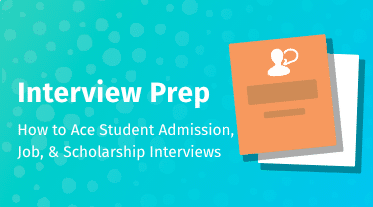
Skills Training
Interview Prep: How to Ace Student Admission, Job, and Scholarship Interviews
Even though you’ll do dozens of interviews during the course of your academic and professional career, you’ve probably had no… Read more
Waterloo Engineering Video Interview – Prep Tips
Many students ask us for tips for preparing for the the Waterloo Engineering video interview.
Here are the ones we think will help you the most for the video and written questions:
TIP #1: PRACTICE MAKES PERFECT
It can seem really scary to see yourself talking on screen and worrying about how you are coming across to the admissions committee.
Open up your camera and practice answering some of the Sample Questions listed below. Recording yourself will help you get the hang of things and get comfortable with seeing yourself on camera.
If you want to take your prep to the next level, work 1-on-1 with a coach and do some mock interviews so you know exactly what to do when you’re recording your answers for real.
TIP #2: ALWAYS ANSWER THE ENTIRE QUESTION
It seems silly, but it is common to get off track and later realize you didn’t answer the question.
Break down each part of the question into smaller components, and address each one as you move through your answer. If you’re working on a written question, take some time at the end while you’re proofreading to make sure you’ve answered everything.
TIP #3: TAKE YOUR TIME
Sometimes when you know you have a limited amount of time you might speed through everything like a mad race against the clock.
For the video questions, remember to take a breath and pause between your sentences to allow the reviewer time to process what you said. Focus on speaking clearly and slowly.
TIP #4: TELL IMPORTANT INFO ABOUT YOU
Remember that every answer you give should tell the interviewer something about you that boosts your application, even if the question isn’t about you.
Highlight your skills and experiences, show that you have thought about goals, and use the questions to help the admissions committee learn more about you. You’re going to be a great addition to their program — tell them how!
TIP #5: BE CONCISE
Your answers should be clear and to the point, leaving out unnecessary information.
In the video questions, you don’t want to ramble — get to the point and be clear, providing clear examples and specific points that fully answer the question. Get rid of information that is repetitive or doesn’t add value. It is better to have a short, concise answer than a convoluted answer that is redundant and possibly unfocused.
TIP #6: BE PROFESSIONAL (BUT ALSO HAVE FUN!)
When preparing for your video questions make sure that you come across as a young professional with something special to offer the program. How can you do this?
- Dress professionally
- Make sure the background behind your camera is empty
- Go somewhere that is quiet and free from distractions
- Sit up straight
- Maintain eye contact with the camera the entire time
While it’s important to be professional, it’s also important to have fun with these questions. The admissions committee wants to admit unique people who have a shining personality and the experiences to match. Show them who you are and be yourself.
TIP #7: DIFFERENTIATE YOURSELF
The admissions committee reviews thousands of applications. You’ll never stand out if your answers are the same as everyone else’s, so come up with answers that are unique.
For example, if there’s a question that asks “Describe a time when you had to adapt” don’t simply talk about how COVID made everything more difficult. Instead, you can talk about an experience where you took on a challenge and tried something that hadn’t been done before. Then, shift the question into talking about your successes and what you learned from the experience.
If you would like more tips to help you prepare, as well as the chance to up your game and do some mock video/written questions, connect with a coach today. Our coaches have helped hundreds of students conquer their video interview questions and achieve admissions success!
You’ve Got a Dedicated Coach in Your Corner
For over a decade, we have worked with thousands of students to help them achieve more than they ever thought possible.
Our coaches have a strong success rate supporting students as they apply to Waterloo Engineering, among other top university programs.
Our 1-on-1 Youth Coaching fills that gap that most high schools miss. We can help you build self-awareness through probing questions and assessments, set bigger goals to elevate your extracurriculars and future career plans, and improve skills that matter on supplementary applications, such as interviewing, written communication, critical thinking, and creativity.
We use a coaching methodology, called ‘full student’ development, that’s been proven to increase your chances of admission to top-tier universities and obtaining competitive jobs/internships.
So, what are you waiting for? Fulfill your post-secondary potential with the mentorship and coaching you’ve always wanted!
IMPORTANT: Want to share information and/or images from this resource on your own website, blog, article, etc.? Please ensure you reference content of any kind published by Youthfully Inc., in whole or in part, using the following statement: (1) Our Organization (Youthfully Inc.); (2) The title of our content/resource; and (3) the URL to our webpage where the content was originally posted. For example: “Sourced from: Youthfully Inc., ‘Waterloo Engineering Interview Questions & AIF Examples 2023/2024’, https://youthfully.com/waterloo-engineering-essay-examples-video-interview-questions/.”
Not doing so is an infringement of copyright and is illegal. We spend significant time developing resources for students, so please take a few seconds to ensure they are referenced properly.
DISCLAIMER: While the information in this blog is considered to be true and correct at the date of publication, and although our team makes every attempt to ensure that the information is accurate and vetted by university staff, Youthfully is not in any way liable for the accuracy of any information printed and stored or in any way interpreted and used by a user.
Section 1: About You A, Qs 1-3
Section 1: About You A, Qs 4-5
Section 2: About You B
Section 3: Courses, Qs 1-3
Section 3: Courses, Qs 4-6
Section 4: Engineering
Video Interview
Get 1-on-1 Support

